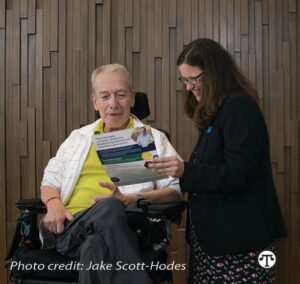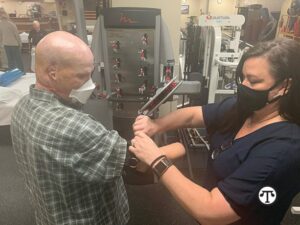Florida State Wide
The Griffis family donated the easement which is within the critical O2O wildlife corridor
Jacksonville, Fla., Oct. 28, 2020 – North Florida Land Trust has received a donation of a conservation easement in Columbia County which lies within the critical Ocala to Osceola, or O2O, wildlife corridor. Sam “Buck” Griffis and his wife, Vickie, donated the land on their 68-acres known as Sweet Gum Farm to make sure it remains free from development forever. A grant NFLT received from the EJK Foundation of Houston, Texas helped to fund the due diligence that was needed to complete the donation.
“Buck and Vickie consider the farm a sanctuary and wanted to make sure no one could come in and turn their beautiful farm into a residential development,” said Jim McCarthy, president of NFLT. “The Griffis’ will continue to own the land where they enjoy raising cattle, horses and chickens while ensuring it will remain a farm and natural forest in perpetuity.”
In addition to the farmlands and some unimproved pastures, the property consists of pine flatwoods, depression marshes, mixed scrub-shrub wetlands and upland hardwood forests. It lies within the boundaries of the Osceola National Forest and is adjacent to the forest on two sides. Preserving the land not only protects it from development but also helps further the objectives of The Forest Plan for the National Forests in Florida. The plan aims to improve ownership patterns of the forest to enable important management techniques including prescribed burning.
The 1.6 million-acre O2O corridor is a preservation focus for NFLT. It provides an important habitat for the Florida Black Bear and numerous endangered species including the red-cockaded woodpecker, indigo snakes and gopher tortoises. The nonprofit is currently leading the O2O Wildlife Corridor Partnership, an effort by public and private organizations to accelerate land conservation within the O2O. Continue reading
 (NAPSI)—Amyotrophic lateral sclerosis (ALS) is a fatal neurological disease that attacks the nerve cells. It first gained national attention as Lou Gehrig’s disease, named after the famous baseball player who was diagnosed with ALS in 1939. To date, the cause of ALS is unknown, and there is still no known cure. The disease strikes quickly, usually leading to death within 2–5 years of diagnosis. But every person with ALS has an individual story, and understanding these stories will help researchers ultimately piece together clues about the disease.
(NAPSI)—Amyotrophic lateral sclerosis (ALS) is a fatal neurological disease that attacks the nerve cells. It first gained national attention as Lou Gehrig’s disease, named after the famous baseball player who was diagnosed with ALS in 1939. To date, the cause of ALS is unknown, and there is still no known cure. The disease strikes quickly, usually leading to death within 2–5 years of diagnosis. But every person with ALS has an individual story, and understanding these stories will help researchers ultimately piece together clues about the disease.
Ed Tessaro was diagnosed with ALS in 2009. As he learned to cope with this diagnosis, he reflects, “I’ve never considered myself a victim of the disease, because I believe in my heart all of us have a wheelchair. In my case, it’s quite literal, but with everything that goes on in my life, I realize that every family has had a crisis.” One of the things that helps him and others with ALS is reaching out for community support and resources. “The ongoing struggle is to encourage newly diagnosed people to come in and talk about their condition. I want to help people learn about the National ALS Registry, clinical trials, and other resources that can provide support and hope.”
The National ALS Registry helps gather information from those who are living with this disease. Researchers from all around the world can access the Registry data to help scientists learn more about what causes this disease. Everyone’s story is different, and everyone’s piece of the puzzle is essential. The Registry has found that more than 16,000 people with ALS live in the United States. It is important to include as many people as possible living with the disease to get the most accurate information. When patients join, it helps give researchers more information. This could lead to a better understanding of the causes of ALS, because learning more about the disease is one step further in the battle to defeat it.
If you or someone you care about has ALS, consider learning more about the National ALS Registry by visiting: www.cdc.gov/als.
 (NAPSI)—The Elizabeth Dole Foundation and U.S. Department of Veterans Affairs have launched an emergency respite care fund for the family caregivers of wounded, ill, and injured veterans. The program, Respite Relief for Military and Veteran Caregivers, will provide non-medical, no-cost, professional home care to veteran caregivers who are struggling during the COVID-19 pandemic. CareLinx, a nationwide professional home care network, helped launch the fund with a donation of $1 million worth of services. Wounded Warrior Project then contributed an additional $1 million to expand the program. The Foundation expects to provide 75,000 hours of care to more than 3,000 veteran caregivers.
(NAPSI)—The Elizabeth Dole Foundation and U.S. Department of Veterans Affairs have launched an emergency respite care fund for the family caregivers of wounded, ill, and injured veterans. The program, Respite Relief for Military and Veteran Caregivers, will provide non-medical, no-cost, professional home care to veteran caregivers who are struggling during the COVID-19 pandemic. CareLinx, a nationwide professional home care network, helped launch the fund with a donation of $1 million worth of services. Wounded Warrior Project then contributed an additional $1 million to expand the program. The Foundation expects to provide 75,000 hours of care to more than 3,000 veteran caregivers.
“The lack of affordable, convenient, professional respite care has always taken a significant toll on the emotional and physical well-being of veteran caregivers,” said Steve Schwab, CEO of the Elizabeth Dole Foundation. “Now, due to the increased health risks and limitations created by the pandemic, we are seeing a spike in the need for short-term relief.”
Even as states re-open, some of the most critically wounded or ill veterans and their caregivers will have a long journey back to the pre-pandemic world. These veterans often have vulnerable immune systems that require their caregivers to take every precaution against exposure. By asking family and friends to keep their distance, they are losing a vital source of daily support.
“We are grateful to CareLinx and Wounded Warrior Project for helping us respond to this urgent need,” Schwab continued. “We hope other organizations also step up, so we can ensure every veteran caregiver suffering during COVID-19 receives the help they need.”
The program is rolling out in select regions and will expand nationwide over time. Eligible caregivers can request services that include companionship, grocery shopping, cooking, mobility assistance, transportation, bathing, and other activities of daily living. AARP and Bob Woodruff Foundation have also joined as key collaborators for this effort to help spread the word to military and veteran caregivers.
To learn more and apply, visit www.hiddenheroes.org/respite.
TALLAHASSEE, Fla.—Attorney General Ashley Moody is securing more than $11 million in relief for Floridians harmed as a result of Ocwen’s alleged improper mortgage servicing practices. The proposed final consent judgment, pending adoption by the U.S. District Court for the Southern District of Florida, resolves the lawsuit brought by the state of Florida through the Attorney General’s Office and the Office of Financial Regulation against Ocwen Financial Corporation, Ocwen Mortgage Servicing, Inc., Ocwen Loan Servicing, LLC and PHH Mortgage Corporation.
The agreement between Florida and Ocwen will provide at least $8.6 million in consumer relief, including $2.1 million to Floridians who were harmed as a result of Ocwen’s alleged servicing failures, including untimely payments of borrowers’ insurance premiums, improper imposition of lender-placed insurance and overcharging for property preservation inspections. Other benefits obtained for Florida borrowers include at least $1 million in mortgage loan modifications and approximately $5.5 million in late fee waivers for eligible borrowers. Ocwen will also pay more than $3 million in civil penalties and reimbursement for the Attorney General Office’s fees and costs.
Attorney General Ashley Moody said, “This resolution is a continuation of our efforts to correct harmful deficiencies in mortgage servicing practices and ensure that distressed homeowners who have been impacted by servicing errors receive much-needed relief—relief that is especially important in these challenging times.” Continue reading
TALLAHASSEE, Fla.—Attorney General Ashley Moody is recognizing October as National Domestic Violence Awareness Month by reminding victims of domestic violence that help is still available to them amid the COVID-19 pandemic. With many Floridians limiting social and professional interactions to stop the spread of the novel coronavirus, domestic violence can be even harder to detect—and victims may not know where to turn for help. Victims do not need to isolate with their abusers and abuse counselors have adapted to the pandemic to provide more communication resources for victims. Advocates can be reached 24/7, 365 days a year through the Florida Domestic Violence Hotline by calling 1(800) 500-1119.
Attorney Ashley General Moody said, “With signs that domestic violence cases may be on the rise amid the COVID-19 pandemic, it is more important than ever for victims of domestic violence to know they have our support and that help is available. Domestic violence shelters across the state are open and advocates are available 24/7 to provide safety to victims and their families with protocols to protect against COVID-19 in place. If you or someone you know are a victim of domestic violence, know you are not alone. Please reach out for help.”
During the COVID-19 pandemic, domestic violence centers have worked tirelessly to ensure that services remain available to survivors and the community. These services not only meet the needs for safety from violence but also incorporate measures to prevent the spread of COVID-19. Domestic violence center outreach and shelter services remain operational and advocates are available 24/7 to develop safety plans for survivors and families based on specific needs throughout the pandemic. Survivors, as well as their friends, family members and other community members can contact any domestic violence center through its 24-hour hotlines. Local certified domestic violence centers have increased the ability to communicate with survivors through the use of various applications. Continue reading
TALLAHASSEE, Fla.—Attorney General Ashley Moody, along with 27 other state attorneys general, obtained a judgment against Tennessee-based Community Health Systems, Inc., and its subsidiary, CHSPSC LLC. This judgment resolves an investigation of a data breach that impacted approximately 6.1 million patients, including more than 430,000 from the state of Florida.
At the time of the data breach, CHS owned, leased or operated 206 affiliated hospitals, including 37 located in Florida. Information exposed in the breach included the addresses, birthdates, names, phone numbers and Social Security numbers of patients. The judgment, agreed to by CHS, requires a $5 million payment to the states and provides that CHS agrees to implement and maintain a comprehensive information security program reasonably designed to safeguard personal information and protected health information that will include specific information security requirements.
Attorney General Ashley Moody said, “Health care patients are routinely asked to reveal personal information in the course of treatment. The added stress surrounding a data breach exposing personal information can be overwhelming. I’m glad we were able to provide relief to the more than 430,000 Floridians impacted by the negligent actions of this health care company.” Continue reading
TALLAHASSEE, Fla.—The COVID-19 pandemic has changed daily routines around the world, but it hasn’t lessened Attorney General Ashley Moody’s resolve to end the deadly opioid crisis plaguing Florida. Even as the novel coronavirus spreads, Attorney General Moody continues efforts to curb the national opioid crisis claiming lives in Florida—issuing statewide recommendations to address the opioid crisis, creating new partnerships to help Floridians struggling with substance abuse and crafting criminal justice training to assist prosecutors in shutting down the sham sober home industry.
Attorney General Ashley Moody said, “Our nation and our state face many challenges, but be assured that nothing will dampen my resolve to put an end to the national opioid crisis that continues to claim lives in our great state. Even before the COVID-19 pandemic struck Florida, we were working hard to stop opioid misuse and save lives, and as we continue to work together to stop the spread of COVID-19, please know that our fight against the deadly opioid crisis has not abated.
“There are signs that the pandemic may be contributing to an increase in opioid deaths, and that is even more reason why we cannot waiver in our fight to stop drug abuse—and why I will continue to work every day, on the local, state and national level, to end this deadly crisis affecting Florida families.” Continue reading
Dear Friends,
As this is being written, Election Day is almost upon us and by the time this reaches you, Americans will have either re-elected Donald J. Trump or they will have chosen the Biden/Harris ticket. Readers know by now that my fervent prayer is that we re-elect our President, and overwhelmingly so, but more importantly, our prayer is for God’s will to be done in all things. While we are confident that President Trump will be victorious, there is no magical crystal ball that can show what the future may hold.
What we do know is this; America’s foundation is still stronger than ever. The vision that our forefathers outlined in our founding documents have stood the test of time and outlived many Presidents, some who were very good, and others who were near disasters. One man will not tear the freedoms and liberties that are stated in our constitution apart. So many of our nation’s heroes have fought and died for these God-given rights and they will not be last. The price of freedom is eternal vigilance and our country still has many patriots that are willing to take that stand. If President Trump is re-elected, our job just got a whole lot easier, but only for a few short years. Continue reading
The President nominates someone for a vacancy on the Court and the Senate votes to confirm the nominee, which requires a simple majority. In this way, both the Executive and Legislative Branches of the federal government have a voice in the composition of the Supreme Court.
Are there qualifications to be a Justice? Do you have to be a lawyer or attend law school to be a Supreme Court Justice?
The Constitution does not specify qualifications for Justices such as age, education, profession, or native-born citizenship. A Justice does not have to be a lawyer or a law school graduate, but all Justices have been trained in the law. Many of the 18th and 19th century Justices studied law under a mentor because there were few law schools in the country.
The last Justice to be appointed who did not attend any law school was James F. Byrnes (1941-1942). He did not graduate from high school and taught himself law, passing the bar at the age of 23.
Robert H. Jackson (1941-1954). While Jackson did not attend an undergraduate college, he did study law at Albany Law School in New York. At the time of his graduation, Jackson was only twenty years old and one of the requirements for a law degree was that students must be twenty-one years old. Thus rather than a law degree, Jackson was awarded with a “diploma of graduation.” Twenty-nine years later, Albany Law School belatedly presented Jackson with a law degree noting his original graduating class of 1912.
How is the Chief Justice selected? Does the most senior Associate Justice become Chief Justice?
Like the Associate Justices, the Chief Justice is appointed by the President and confirmed by the Senate. There is no requirement that the Chief Justice serve as an Associate Justice, but 5 of the 17 Chief Justices have served on the Court as Associate Justices prior to becoming Chief Justice.
Three were members of the Court when they were elevated to Chief Justice:
Edward Douglas White (Associate Justice 1894-1910, Chief Justice 1910-1921)
Harlan Fiske Stone (Associate Justice 1925-1941, Chief Justice 1941-1946)
William H. Rehnquist (Associate Justice 1972-1986, Chief Justice 1986-2005)
Two had a break in service between their periods of service:
John Rutledge (Associate Justice 1789-1791, Chief Justice 1795)
Charles Evans Hughes (Associate Justice 1910-1916, Chief Justice 1930-1941)
How long is the term of a Supreme Court Justice?
The Constitution states that Justices “shall hold their Offices during good Behavior .”
This means that the Justices hold office as long as they choose and can only be removed from office by impeachment
Has a Justice ever been impeached?
The only Justice to be impeached was Associate Justice Samuel Chase in 1805.
The House of Representatives passed Articles of Impeachment against him; however, he was acquitted by the Senate.
Has a Justice ever been impeached?
The only Justice to be impeached was Associate Justice Samuel Chase in 1805. The House of Representatives passed Articles of Impeachment against him; however, he was acquitted by the Senate.
Folks have been seeking the clear waters of Marion County for millennia.
But it was in the years following the Civil War that Silver Springs began to attract tourists from the North via steamboats up the Silver River, according to the website for Silver Springs State Park.
It wasn’t until the late 1870s that Hullam Jones and Phillip Morrell fixed a piece of glass to the bottom of a rowboat and created the first glass bottom boat.
Col. W.M Davidson and Carl Ray, who acquired rights to the springs, near Ocala, in 1924, perfected a gasoline-powered version of the glass bottom boat.
About 20 movies were filmed there, including “Rebel Without a Cause,” starring James Dean, “Distant Drums,” starring Gary Cooper, the James Bond movie “Moonraker,” “Creature from the Black Lagoon” and six Tarzan flicks, according to the website. Episodes of television shows such as “Sea Hunt” also were filmed.

